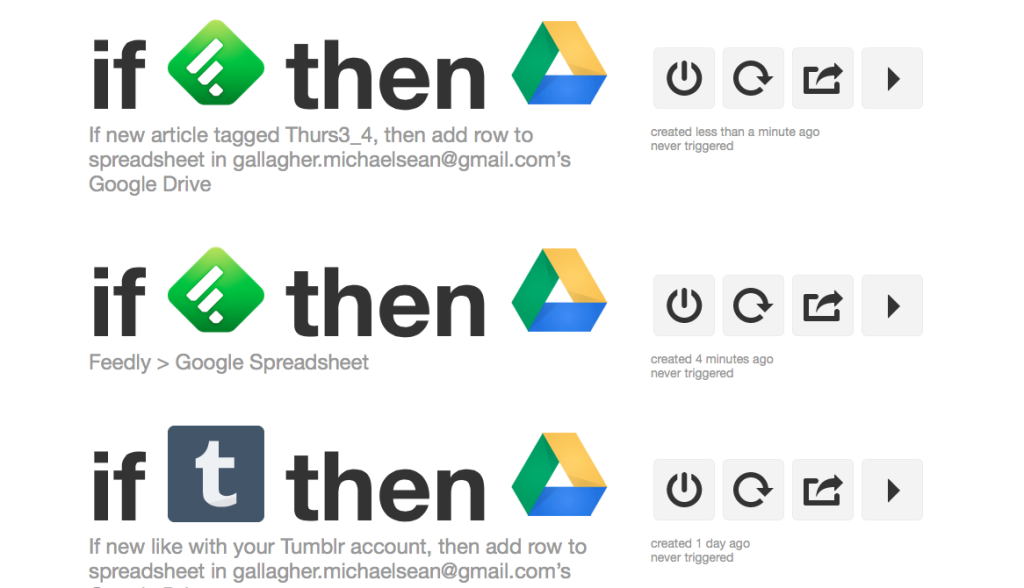A pragmatic post here on how I am using IFTTT to manage my feedback to students on their writing and recorded audio texts. I wrote a post recently on how I use Feedly to manage student submissions and homework submitted through Tumblr and Audioboo. I use Tumblr and Audioboo for different classes, but the end result is over five hundred submissions per week (from approximately 200 students). I try to give feedback at a rate of 20 students per day, so ideally I am able to cycle through everyone every 10 days. The feedback I deliver by reblogging their Tumblr post and adding my comments. On Audioboo, I comment through an audio comment on their original post. I organize all of this in Feedly.
However, the sheer mass of submissions and the mass of feedback I am trying to give has revealed a flaw in this approach. It has proven very difficult to easily track to whom I am giving feedback (to make sure everyone is getting feedback). There is no easy tracking method that I can think of, so I turned to IFTTT to automate some of this activity. IFTTT is a very very user-friendly approach to using APIs, those magical open data streams coming from some of the major social and productivity applications. For the average person (myself included), they are difficult to make work. IFTTT allows you to simplify that process by resorting to IFTT logic. This logic is “if this, then that.” For example, if I post to WordPress, then post to Twitter. IFTTT makes this very easy with big buttons and an intuitive interface.
So I have all of these incoming submissions (already tracked) and outgoing feedback (not being tracked). I resort to IFTTT to track my feedback by triggering an event every time I tag a post in Feedly. I created tags for each of my classes according to the times I teach them (Wed9-11, Thurs1-3, etc.) in Feedly. Every time I now go to give feedback, I first tag the post with one of these tags. IFTTT then picks up that activity and triggers the next event, which in this case is to create a new line on a spreadsheet I created for each class in Google Drive. So I can now easily see what posts I have given feedback on. Here is a quick visual walkthrough.
Wish List (or what would make this process so much smoother)
I would love to see Audioboo create RSS for all activity, not just new posts. That way, my comments on a student’s post could trigger an addition to the Google Spreadsheet rather than going through the middleman of Feedly. Tumblr is alright with this, because reblogged posts (the ones I use to give feedback to students) can be picked up by IFTT to trigger an addition to the Google Drive.
Big picture, what I would love is a tool that allows me to do this from a centralized dashboard, something that incorporates several of these tools (Tumblr, Audioboo, Feedly, Dropbox or Google Drive, and IFTTT to coordinate) into a dashboard so I can easily see who I haven’t given feedback to or columns where I can sort the last time feedback was given. I don’t know of any tool that tries to bring in these streams like this, although gRSShopper could be appropriated this way (assuming all the students were generating RSS feeds of all their activity).
The problem really is with the RSS feeds. Five years ago, these were fairly standard and they were delineated (Posts vs. Comments, etc.); one could generate RSS feeds from Twitter searches or find the RSS or KML from Flickr sets. Not so much anymore. This is a shame for those who like to assemble things for a particular teaching or learning need. It is important for us to be critical of services that discontinue these features. We are speaking as consumers and citizens. It is feedback. I have actively disengaged from services that don’t allow downloading of all content that one has put in there. I advise my students to do the same. I have found workarounds to get their data out of Tumblr, but Tumblr you should really have an export function. Audioboo’s workaround is right clicking the URL and saving (as an MP3), but they should have it as well. Workarounds always exists, yes, but this is a trust issue and it greatly affects buy-in to your service.
I am generating legions of students savvy enough to read these signs, to know when a service is there for the long term (i.e., nothing Google floats out there), to know when a service trusts its users (export function, separating tools from environments), and to know what exactly the service is adding in terms of value to their processes and learning practices. IFTTT is a good value add. Feedly as well. Audioboo and Tumblr have strengths, but need some work. WordPress is great and the blogging tool I will probably use next semester. All offer something, but all exact a cost. Important to consider what those costs are.








[…] A pragmatic post here on how I am using IFTTT to manage… […]
Again, older post but revisiting: Using #IFTTT to manage (large) course feedback https://t.co/K41SgGK7VD #mlearning https://t.co/kPpu0cxQww
RT @mseangallagher: Again, older post but revisiting: Using #IFTTT to manage (large) course feedback https://t.co/K41SgGK7VD #mlearning htt…